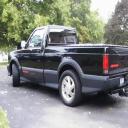Yahoo Answers is shutting down on May 4th, 2021 (Eastern Time) and beginning April 20th, 2021 (Eastern Time) the Yahoo Answers website will be in read-only mode. There will be no changes to other Yahoo properties or services, or your Yahoo account. You can find more information about the Yahoo Answers shutdown and how to download your data on this help page.
Trending News
will spraying fresh water over my AC condenser make it save energy?
Well my Home AC is working fine, its just that is old and its so hot outside. I want to know if spraying some fresh water over the condenser will help it to save on energy or work more efficient.
BTW water is cheaper than electricity so forget about the whole saved here wasted there comments.
my unit has a condenser which is made of aluminum tubing covered in some king of short pieces of AL foil just like strips. the only way I can best describe it is " as a Christmas tree ornament type of rope"
I don't think this is an efficient design though. I've already cleaned it on the outside so the only thing left is increase its efficiency somehow. if possible .
can someone help me figure out which would be the most efficient condenser for this unit. its a trane XE900 +-21 years old. everything works good but I want to know how to make it more efficient.
I saw some new model on Trane web page. 2 different units were rated differently even though they were the same size. 1 was 1Db louder than the other. !!!???WT???
in any case I am after a better condenser. I think its rated at 1.5Ton
14 Answers
- ChiefmanycrowsLv 510 years agoFavorite Answer
Spraying water onto the condensor coils will make them operate at slightly lower pressures and therefore require slightly less energy. But the unit will not run with substantially more efficiency. A unit made 20+ years ago is working on borrowed time. Most units have a life expectancy of 7 to 12 years. Today's units are much more efficient than yesterday's. The increase in efficiency is due to the coils being constructed larger and offering greater heat transfer rates because of the greater surface area of the coils. Your unit operates with R-22, but new systems use R-410a. R-410a operates at higher pressures than R-22 so the coils have to be stronger. You will need to replace both the indoor coil and the outdoor unit and the refrigerant line set at some point. You should also consider replacing the furnace with a higher efficiency one at the same time.
Source(s): 40+ years in the industry licensed Chief Engineer since 1981 12+ years teaching hvac at the technical institute level - 6 years ago
I would not hose down the condenser but on a high relative humidity day you could help your system by (if you have a condensate pump) directing the condensate water towards the condenser coil. Make sure it is not splashing on any other component or on any wires. I believe this would relieve the overall load and would save money; only on high humidity days when there will be plenty of free water in the air. Attach a pressure manifold gauge and take the amp readings before and after you try this. You will be amazed!
- ?Lv 710 years ago
You aren't able to make it more efficient than for the time it was desgined, EER ratings were about 8-9 back then at the most. At 21+ years of use you should budget for an upgrade which will have a minimum SEER rating of 13 or more. The new systems will use R-410 refrigerant so plan on a new evaporator, condensor, and copper lines as well, and consider a furnace as for the expense you'll incur doing this it won't be that much more to do it. Your return on the investment may be short as long as the ducts are in good shape and the house has proper insulation.
Source(s): HVAC professional - Jackrabbit SlimLv 710 years ago
if you spray it with water, the condenser will run at a cooler temerature. saving wear and tear on your capacitors and compressor. but any energy savings will be negligible. freon enters the compressor before it enters the cooling coil. which means the work that the compressor does happens before it gets to the coil. when you spray the condenser with water, what you are doing is making for a colder indoor coil. which is in turn heated up by the warm air in the house. chances are, by the time the freon comes back to the compressor you havent saved much. keep in mind that constant water on your condensing unit can cause calcium and other minerals in the water to build up on the aluminium coil or rust the steel casing and structure of the unit. when minerals build on the coil, you get less airflow, meaning less efficiency. if a brace in the steel rusts loose, it can cause vibrations that rub holes in your aluminium coil.
a note on cleaning your own condenser coil:
alwats disconnect the power, remove the top of the unit and clean from the inside out. the fan draws air from the outside in, so trying to clean from the outside in will only push debris further into the coil, making it more difficult to remove. cleaning from the inside pushes the debris right back out the way it came in. this can be done with only a water hose, but foaming coil cleaner will make the job go much faster. be sure to read the entire bottle before using, and pay close attention to mixing directions if you buy the concentrated stuff. make sure you get a non-acidic alkaline based cleaner and brightener. Nu-Brite makes a purple cleaner that i use on all aluminium coils.
- How do you think about the answers? You can sign in to vote the answer.
- ?Lv 45 years ago
YES.... That water is condensation when the warm, filthy air inside your home is drawn into the AC and contacts the cold, dirty condenser. It then is collected in a shallow, mold-crusted pan inside your AC before draining into an open, bug and critter accessible, pipe which runs outside. You would be an idiot to drink something like that. Have a beer instead...
- tinman97prnLv 710 years ago
A light misting will make it work more efficiently (it will improve add the energy transfer from water evaporation to the normal convective transfer).
The risk that you run is the extra water will speed up corrosion, especially of any steel components.
As far efficiency and size, there is no correlation. Size in the simplest terms is basically output. Efficiency is output per input. For a comparison think of modern cars versus old. A car from the 50's that put out 200 HP would get 10 miles to the gallon. Modern cars will get 25 MPG and put out the same HP.
- RedNekLv 610 years ago
You wouldn't save any money that way. But I had to put a sprinkler under a condenser for a water chiller before. It was all of 100 degrees that day, and without the 'Chiller' we'd have even bigger problems. After I put the sprinkler under it the process water did get colder and it ran that way for a few weeks until the weather got cooler. Putting a small sprinkler on your condenser won't save anything, but it will help to pull cooler air across those coils. Yeah, it's kinda 'Hill Billy', but it works
- 10 years ago
You telling me to forget about the whole saved here wasted...! So how you ask for advise then?. The facts here are that if you stand with your garden hose out there and spray the AC condenser, of course it will help to cool down faster the freon in there and will save you some electricity, but the energy saved on the condenser will increase your water bill. It's like taking from Paul to give to it to John Good luck...!
- Anonymous10 years ago
One safer option is to pitch a tent or some sort of sun blocker over your outside unit if it is exposed to sunlight during the day. Putting it in the shade can help.






